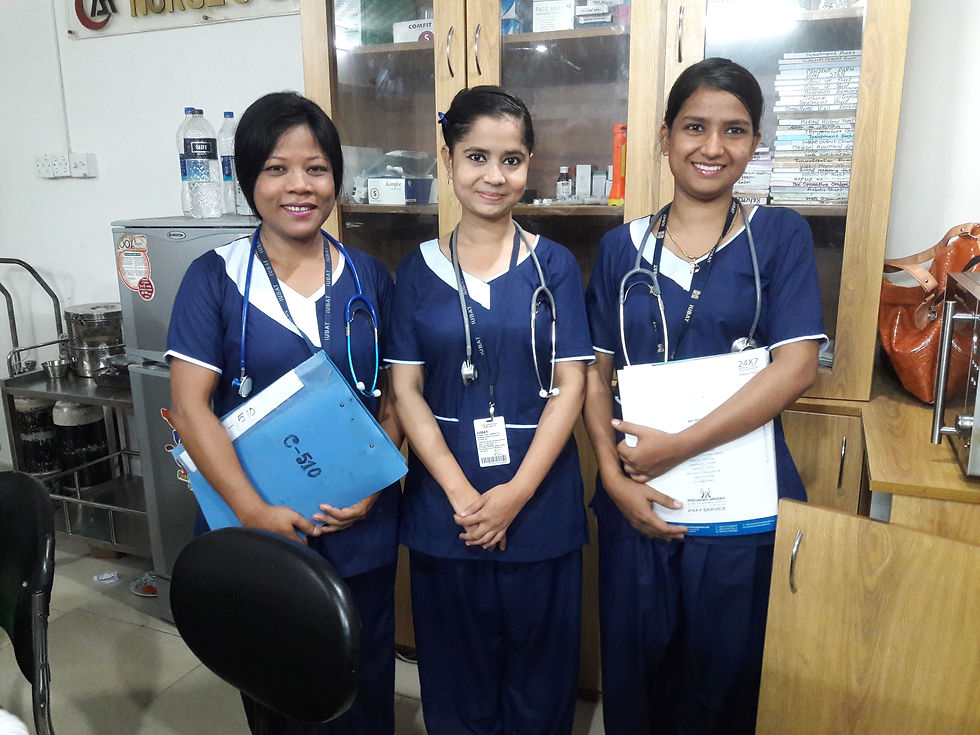The journey for some students through the rigorous training program at IUBAT is decidedly challenging, and the English language instruction, as well as comprehensive curriculum, require dedication and hard work in order to master. Samir Chandra Das is a graduate from our College of Nursing and is now finding success in his career as a registered nurse, but he describes the bumps he encountered along the way, and the support he received in return. He writes:

“My name is Samir, and I graduated from the College of Nursing at International University of Business Agriculture and Technology (IUBAT) in 2014. As a child, I wanted to be a health care leader. I love to serve those that are marginalized, poor and vulnerable. As I love working with people, I selected nursing as a profession, since there are many opportunities to serve and benefit that population. Furthermore, my brother inspired me greatly to pursue nursing. He explained to me what nursing was all about and about the prospects and job fulfillment.
Once I made the final decision to become a nurse, I was looking for the most reputable nursing institution. That is when I encountered IUBAT. After my admission to IUBAT, I met with Dr. Karen Lund, the Faculty Chair for Health Sciences at IUBAT. She spoke to me about the variety of job prospects that I could have after graduation, including other benefits regarding nursing jobs in Bangladesh and abroad. At the beginning of my studies, I was quite depressed because of my poor English skills. After some time, however, I met with our respected Alex Berland, Senior Advisor in Health Sciences at IUBAT. I shared my problems regarding my studies with him, and he gave me some valuable suggestions that helped me with completion of my studies and with my English skills and competency. I am really grateful to IUBAT and our faculty whom taught me, including our international volunteers and national staff. Because of all of them, I am where I am now.

Just after my graduation from IUBAT, I got an opportunity to work at Gastro Liver Hospital and Research Institute in Dhaka as a staff nurse. Currently, I am working in Medecins Sans Frontieres-Holland (MSF-H), Bangladesh as an Occupational Health nurse since November, 2015.
As an Occupational Health nurse, my role is to provide basic health care to the factory workers and to find out the occupational health diseases. I am also responsible for providing vaccinations to the children, women and male factory workers, medication administration, IV cannulation, nebulization, dressing, history taking, room temperature monitoring, measuring of vital signs, maintenance of infection control protocols, patient counselling, maintenance of medicine inventory and consumption, maintenance of the cold chain of vaccine, and performance of laboratory tests such as urinalysis, pregnancy tests, syphilis etc.

My opinion is that the College of Nursing at IUBAT is the best nursing college in Bangladesh. The knowledge that I learned from IUBAT is really essential for my practical services. I am thankful to IUBAT and our all faculty (national and international) for their valuable suggestions and time, which make me competent enough to provide standard quality of care to patients. Again, thank you so much for everyone who was with me in my entire nursing journey.”
Thank you for sharing your accomplishments and challenges, Samir, and we are certain that your story will bolster and encourage students currently in the program who may be facing some difficulties of their own. We congratulate you on your new position with Médecins Sans Frontières, and we hope that you continue to thrive and grow in your role as a nurse.





